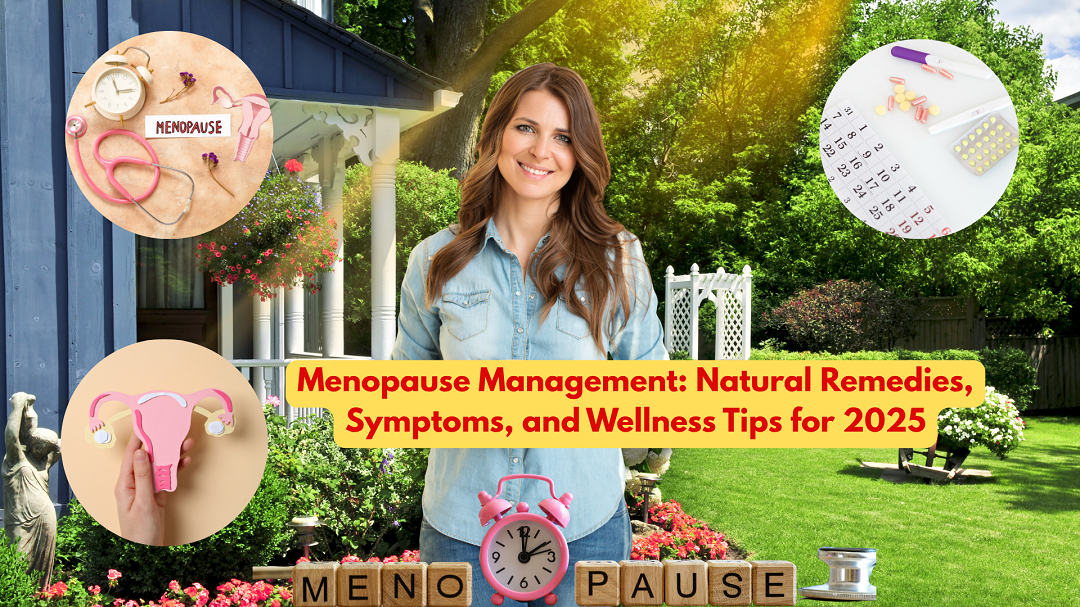

+1 855-448-0275
Worldwide Express Shipping


Menopause marks a significant transition in a woman's life, signaling the end of menstrual
cycles and fertility. As we step into 2025, advancements in women's health research, combined
with timeless natural approaches, offer more empowering ways to navigate this phase. Whether
you're experiencing hot flashes, mood swings, or skin changes, effective menopause
management can enhance your quality of life. This comprehensive guide explores the latest
symptoms, proven natural remedies, and wellness tips tailored for 2025, drawing from emerging
science and holistic practices to help you thrive.
With over 1 million women entering menopause annually in the USA, searches for "menopause
natural remedies" and "menopause symptoms relief" have surged by 25-40% year-over-year.
Our goal is to provide in-depth, actionable insights that surpass standard advice, positioning this
as your ultimate resource for menopause management in 2025.
Menopause typically occurs between ages 45 and 55, with the average age in the US being 52. It's defined as 12 consecutive months without a period, preceded by perimenopause (the transitional phase) and followed by postmenopause. During this time, ovaries produce less estrogen and progesterone, leading to hormonal fluctuations that affect nearly every system in the body.
Perimenopause: Begins in the mid-40s for many, lasting 4-10 years. Irregular periods,
hot flashes, and mood changes emerge as hormone levels fluctuate.
Menopause: The official point when periods stop. Symptoms may peak here.
Postmenopause: The years after, where symptoms often ease, but long-term health
risks like osteoporosis and heart disease increase due to sustained low estrogen.
In 2025, research highlights how lifestyle and genetics influence these stages. For instance, emerging studies on ovarian longevity suggest interventions could delay menopause by years
Menopause symptoms vary widely, but up to 80% of women experience them. With modern stressors like environmental toxins and sedentary lifestyles exacerbating issues, here's a breakdown of the most searched symptoms:
Hot Flashes and Night Sweats: Affecting 75% of women, these sudden heat surges
can disrupt sleep. In 2025, nonhormonal treatments like fezolinetant (an FDA-approved
oral medication targeting the brain's temperature regulation) offer new relief.
Vaginal Dryness and Discomfort: Low estrogen thins vaginal tissues, leading to pain
during intimacy. This impacts libido and relationships—areas where female
enhancement options like Lovegra (sildenafil for women) can support arousal and
sensitivity, always under medical guidance.
Sleep Disturbances: Insomnia or fragmented sleep from night sweats affects energy
and mood.
Weight Gain and Metabolic Changes: Hormonal shifts slow metabolism, often leading
to abdominal fat gain. Recent data shows a 5-10% increase in body weight during
perimenopause.
Skin and Hair Changes: Collagen loss causes wrinkles, dryness, and thinning hair.
Dermatologist-recommended retinoids like Tretinoin Cream (available in 0.025%, 0.05%,
or 0.1% strengths) promote cell turnover, reducing fine lines and acne flare-ups common
in menopause.
Bone and Joint Issues: Estrogen decline raises osteoporosis risk; joint pain from
inflammation is common.
Mood Swings and Anxiety: Fluctuating hormones can mimic PMS but intensify.
Brain Fog and Fatigue: Memory lapses and concentration issues affect daily life.
Low Libido: Reduced sexual desire, often tied to dryness and fatigue.
Emerging 2025 trends note increased reports of "menopause brain" due to chronic stress, with AI-driven apps now tracking symptoms for personalized insights.
While hormone replacement therapy (HRT) remains a gold standard for severe symptoms, many women prefer natural remedies. Backed by recent studies, these holistic approaches focus on symptom relief without side effects
Black Cohosh: A staple for hot flashes, a 2025 review confirms it reduces frequency by
up to 26%. Take 40-80mg daily.
Red Clover: Rich in isoflavones (plant estrogens), it eases night sweats. Combine with
soy for better results.
Pueraria Mirifica: This Thai root boosts libido, skin glow, and bone strength—popular in
2025 for its estrogen-mimicking effects. Start with 1/4 tsp in warm water.
Vitex (Chaste Tree Berry): Balances hormones by lowering prolactin; effective for mood
swings and PMS-like symptoms in perimenopause.
Other Herbs: Dong Quai, Licorice Root, and Shatavari support overall hormonal health
Always consult a doctor, as herbs can interact with medications.
A Mediterranean-style diet rich in phytoestrogens is key.
Phytoestrogen-Rich Foods: Flaxseeds, sesame seeds, chickpeas, and soy help mimic
estrogen. Aim for 1-2 tbsp flaxseeds daily.
Anti-Inflammatory Foods: Turmeric, ginger, and omega-3s from walnuts reduce joint
pain.
Calcium Boosters: Ragi, sesame, and dairy prevent bone loss.
Hydration and Teas: Sage tea for hot flashes; ginger with honey for digestion.
Avoid processed foods, alcohol, and spicy items to minimize sweat composition changes
Yoga and Meditation: Reduces stress and hot flashes by 30-40% in studies. Try poses
like child's pose for relaxation.
Acupuncture: Effective for sleep and mood; 2025 integrations with apps make it
accessible.
Breathing Exercises: Buteyko or bag breathing increases CO2 for energy
Beyond remedies, daily habits form the foundation of menopause management
Aim for 150 minutes of moderate activity weekly
Weight-Bearing Workouts: Walking, swimming, or resistance training builds bone
density.
Grounding: Walk barefoot to lower cortisol.
Infrared Saunas: Detoxify and ease joint pain
● Prioritize 7-9 hours; use magnesium baths or L-theanine supplements.
● Set boundaries to reduce emotional drain.
Menopause accelerates skin aging; incorporate Tretinoin into routines for visible results in 8-12 weeks. For intimacy, Lovegra enhances sensitivity—discreetly available with fast USA shipping.
● Personalized Hormone Apps: Track symptoms with AI.
● Nonhormonal Meds: Fezolinetant for hot flashes.
● Ovarian Longevity Research: Potential to extend fertility window
For those seeking trusted support, pharmacies like MyMedicineStore.org offer FDA-compliant options. Buy Lovegra 100mg online for libido boost or order Tretinoin Cream with discreet USA delivery—ensuring privacy and quality
A: Often in perimenopause, around age 45-50
Q: Are natural remedies safe?A: Yes, but consult a healthcare provider, especially if on medications.
Q: How long do symptoms last?A: 4-5 years on average, but vary.
Q: Can I buy menopause aids without prescription?A: Many supplements yes; for meds like Lovegra, check FDA guidelines.
Menopause isn't an end—it's a new chapter. With natural remedies, wellness tips, and 2025 innovations, you can manage symptoms effectively. Prioritize self-care, consult professionals, and explore reliable sources like MyMedicineStore.org for women's wellness medicines. Embrace this phase with confidence and vitality